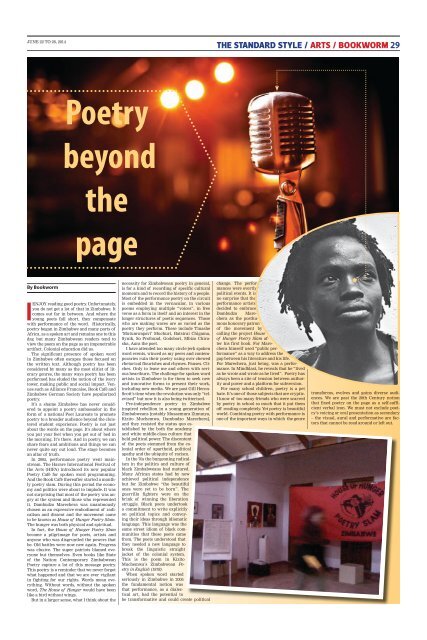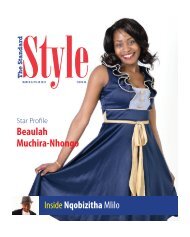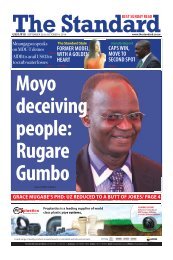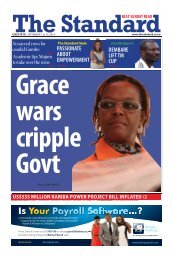The Standard 22 June 2014
You also want an ePaper? Increase the reach of your titles
YUMPU automatically turns print PDFs into web optimized ePapers that Google loves.
JUNE <strong>22</strong> TO 28, <strong>2014</strong><br />
THE STANDARD STYLE / ARTS / BOOKWORM 29<br />
Poetry<br />
beyond<br />
the<br />
page<br />
By Bookworm<br />
I<br />
ENJOY reading good poetry. Unfortunately,<br />
you do not get a lot of that in Zimbabwe. It<br />
comes out far in between. And where the<br />
young poets fall short, they compensate<br />
with performance of the word. Historically,<br />
poetry began in Zimbabwe and many parts of<br />
Africa, as a spoken art and remains one to this<br />
day, but many Zimbabwean readers tend to<br />
view the poem on the page as an impenetrable<br />
artifact. Colonial education did us.<br />
<strong>The</strong> significant presence of spoken word<br />
in Zimbabwe often escapes those focused on<br />
the written text. Although poetry has been<br />
considered by many as the most elitist of literary<br />
genres, the many ways poetry has been<br />
performed has eluded the notion of the ivory<br />
tower, making public and social impact. Venues<br />
such as Alliance Francaise, Book Café and<br />
Zimbabwe German Society have popularized<br />
poetry.<br />
It’s a shame Zimbabwe has never considered<br />
to appoint a poetry ambassador in the<br />
form of a national Poet Laureate to promote<br />
poetry to a broader audience beyond the cloistered<br />
student experience. Poetry is not just<br />
about the words on the page. It's about where<br />
you put your feet when you get out of bed in<br />
the morning. It’s there. And in poetry, we can<br />
share fears and ambitions and things we can<br />
never quite say out loud. <strong>The</strong> stage becomes<br />
an altar of truth.<br />
In 2005, performance poetry went mainstream.<br />
<strong>The</strong> Harare International Festival of<br />
the Arts (HIFA) introduced its now popular<br />
Poetry Café for spoken word programming.<br />
And the Book Café thereafter started a monthly<br />
poetry slam. During this period the economy<br />
and politics were about to implode. It was<br />
not surprising that most of the poetry was angry<br />
at the system and those who represented<br />
it. Dambudzo Marechera was unanimously<br />
chosen as an expressive embodiment of radicalism<br />
and dissent and the movement came<br />
to be known as House of Hunger Poetry Slam.<br />
<strong>The</strong> hunger was both physical and spiritual.<br />
In fact, the House of Hunger Poetry Slam<br />
became a pilgrimage for poets, artists and<br />
anyone who was disgruntled the powers that<br />
be. Old battles were now new again. Progress<br />
was elusive. <strong>The</strong> super patriots blamed everyone<br />
but themselves. Even books like State<br />
of the Nation: Contemporary Zimbabwean<br />
Poetry capture a lot of this message poetry.<br />
This poetry is a reminder that we never forget<br />
what happened and that we are ever vigilant<br />
in fighting for our rights. Words mean everything.<br />
Without words, without the spoken<br />
word, <strong>The</strong> House of Hunger would have been<br />
like a bird without wings.<br />
But in a larger sense, what I think about the<br />
necessity for Zimbabwean poetry in general,<br />
is for a kind of recording of specific cultural<br />
moments and to record the history of a people.<br />
Most of the performance poetry on the circuit<br />
is embedded in the vernacular, in various<br />
poems employing multiple “voices”, in free<br />
verse as a form in itself and an interest in the<br />
longer structures of poetic sequences. Those<br />
who are making waves are as varied as the<br />
poetry they perform. <strong>The</strong>se include Tinashe<br />
‘Mutumwapavi’ Muchuri, Batsirai Chigama,<br />
Synik, So Profound, Godobori, Mbizo Chirasha,<br />
Aura the poet.<br />
I have attended too many circle-jerk spoken<br />
word events, winced as my peers and contemporaries<br />
ruin their poetry using over chewed<br />
rhetorical flourishes and rhymes. Pauses. Cliches.<br />
Only to leave me and others with serious<br />
heartburn. <strong>The</strong> challenge for spoken word<br />
artists in Zimbabwe is for them to seek new<br />
and innovative forms to present their work,<br />
including new media. We are past Gill Heron-<br />
Scott’s time when the revolution was only “televised”<br />
but now it is also being twitterised.<br />
Pre-independence poetry in Zimbabwe<br />
inspired rebellion in a young generation of<br />
Zimbabweans [notably Musaemura Zimunya,<br />
Kizito Muchemwa, Dambudzo Marechera],<br />
and they resisted the status quo established<br />
by the both the academy<br />
and white middle-class culture that<br />
held political power. <strong>The</strong> discontent<br />
of the poets stemmed from the colonial<br />
order of apartheid, political<br />
apathy and the ubiquity of racism.<br />
In the 70s the burgeoning radicalism<br />
in the politics and culture of<br />
black Zimbabweans had matured.<br />
Many African states had by now<br />
achieved political independence<br />
but for Zimbabwe “the beautiful<br />
ones were yet to be born”. <strong>The</strong><br />
guerrilla fighters were on the<br />
brink of winning the liberation<br />
struggle. Black poets undertook<br />
a commitment to write explicitly<br />
on political topics and conveying<br />
their ideas through idiomatic<br />
language. This language was the<br />
same street idiom of black communities<br />
that these poets came<br />
from. <strong>The</strong> poets understood that<br />
they needed a new language to<br />
break the linguistic straight<br />
jacket of the colonial system.<br />
This is the poem in Kizito<br />
Muchemwa’s Zimbabwean Poetry<br />
in English (1978).<br />
When spoken word started<br />
seriously in Zimbabwe in 2005<br />
the fundamental notion was<br />
that performance, as a dialectical<br />
art, had the potential to<br />
be transformative and could create political<br />
change. <strong>The</strong> performances<br />
were overtly<br />
political events. It is<br />
no surprise that the<br />
performance artists<br />
decided to embrace<br />
Dambudzo Marechera<br />
as the posthumous<br />
honorary patron<br />
of the movement by<br />
calling the project House<br />
of Hunger Poetry Slam after<br />
his first book. For Marechera<br />
himself used “public performance”<br />
as a way to address the<br />
gap between his literature and his life.<br />
For Marechera, just being, was a performance.<br />
In Mindblast, he reveals that he “lived<br />
as he wrote and wrote as he lived”. Poetry has<br />
always been a site of tension between authority<br />
and power and a platform for subversion.<br />
For many school children, poetry is a pet<br />
hate. It’s one of those subjects that are cryptic.<br />
I know of too many friends who were scarred<br />
by poetry in school so much that it put them<br />
off reading completely. Yet poetry is beautiful<br />
world. Combining poetry with performance is<br />
one of the important ways in which the genre<br />
transforms, evolves and gains diverse audiences.<br />
We are past the 20th Century notion<br />
that fixed poetry on the page as a self-sufficient<br />
verbal icon. We must not exclude poetry’s<br />
voicing or oral presentation as secondary<br />
– the visual, aural and performative are factors<br />
that cannot be read around or left out.


















